Unlocking the Brain’s Potential with Nootropic Mushrooms
In the expanding realm of natural medicine and integrative neuroscience, few substances have garnered as much attention as nootropic mushrooms. These remarkable fungi have transcended their culinary appeal to become revered agents of brain function enhancement. With a growing body of research underscoring their efficacy, these mushrooms are now being seriously considered for their capacity to support long-term cognitive improvement. This term, cognitive improvement, refers to the enhancement of key mental functions such as memory, attention, learning, and problem-solving—all critical for academic success, professional performance, and quality of life. Understanding how these mushrooms influence the brain involves not just an exploration of their bioactive compounds, but also a deep dive into neurobiology, neurogenesis, and the delicate chemistry of neurotransmitters.
You may also like: The Ultimate Guide to the Best Nootropic Mushrooms for Memory and Cognitive Enhancement
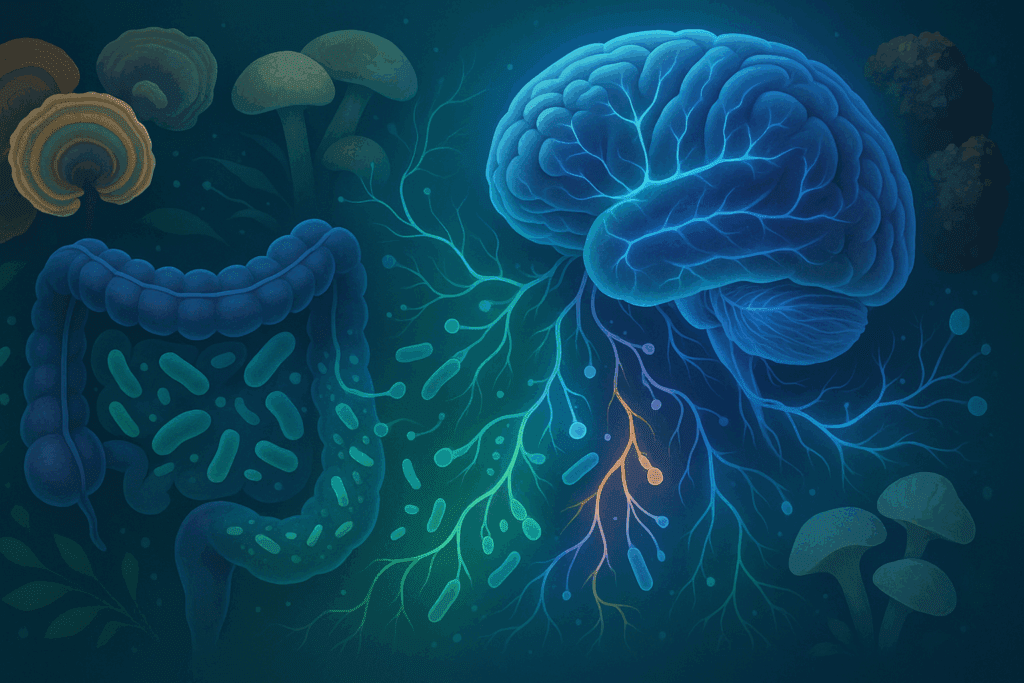
Exploring the Gut-Brain Axis: How Mushrooms Influence Cognitive Pathways
In recent years, the concept of the gut-brain axis has emerged as a critical paradigm in understanding human cognition. This bidirectional communication system links the gastrointestinal tract and the central nervous system through a complex network of neurons, hormones, and microbial signals. Intriguingly, several nootropic mushrooms—such as Turkey Tail and Chaga—are increasingly recognized for their role in modulating this axis. By supporting the health and diversity of the gut microbiome, these fungi indirectly shape neurotransmitter production, reduce systemic inflammation, and enhance nutrient absorption, all of which are essential for optimal cognitive function.
One of the primary mechanisms through which mushrooms affect the gut-brain axis is through their prebiotic content. Polysaccharides found in mushrooms serve as nourishment for beneficial gut bacteria, promoting the proliferation of strains that produce key neuroactive compounds such as serotonin, dopamine, and GABA. These neurotransmitters are deeply involved in mood regulation, motivation, memory, and executive function. A healthier microbiome is also associated with reduced levels of lipopolysaccharides—pro-inflammatory molecules that can compromise the blood-brain barrier and disrupt cognitive processes.
Moreover, mushrooms contain beta-glucans, which stimulate the production of short-chain fatty acids (SCFAs) like butyrate. SCFAs play a critical role in maintaining intestinal integrity and modulating immune responses. When gut inflammation is reduced, the brain benefits through improved signaling efficiency and reduced neural stress. This integrated support system provided by nootropic mushrooms reinforces the concept that cognitive improvement does not occur in isolation but is profoundly influenced by systemic physiological harmony. Incorporating gut-supportive mushrooms into one’s diet can thus represent a foundational strategy for enhancing mental clarity and cognitive resilience.
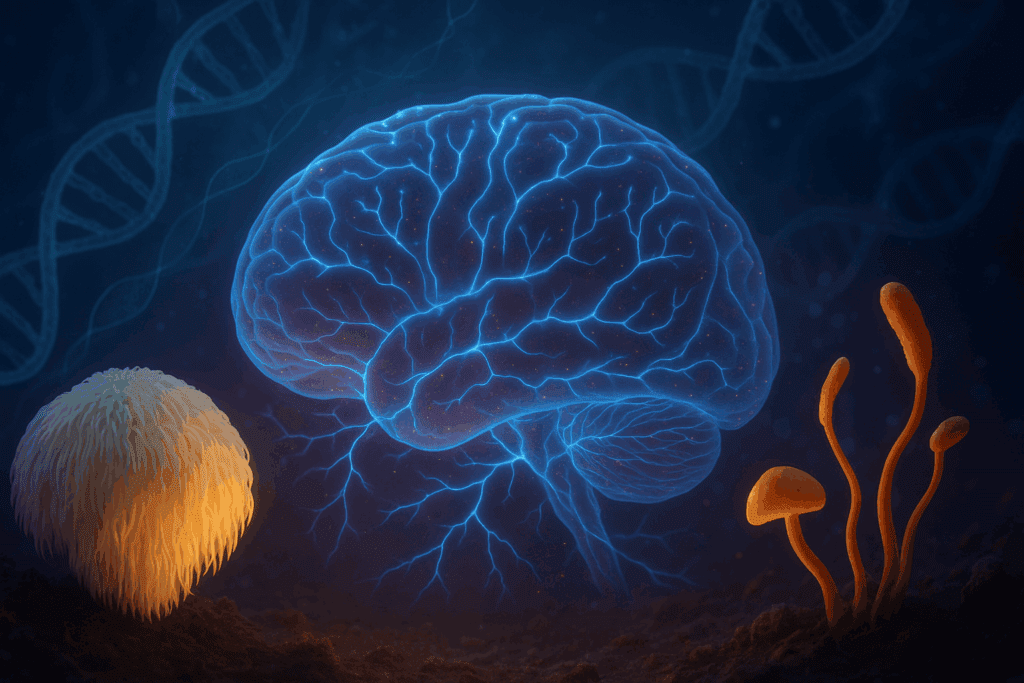
Nootropic Mushrooms and Neuroplasticity: Rewiring the Brain Naturally
Neuroplasticity—the brain’s ability to reorganize and form new neural connections throughout life—is central to learning, memory, and adaptive behavior. Many age-related cognitive declines are attributed to a decrease in this plastic potential. Emerging research indicates that certain nootropic mushrooms, especially Lion’s Mane and Cordyceps, can enhance neuroplasticity by stimulating the production of neurotrophins like BDNF (brain-derived neurotrophic factor) and NGF (nerve growth factor). These proteins support the survival, differentiation, and growth of neurons, facilitating the brain’s capacity to adapt and learn.
When BDNF levels are elevated, the hippocampus—a region vital for learning and memory—becomes more responsive. Increased synaptic density and stronger neural pathways result in faster processing speeds and improved retention. Nootropic mushrooms work by upregulating the genes responsible for neurotrophin synthesis, particularly in areas vulnerable to age-related degeneration. This molecular activation occurs alongside reductions in oxidative stress, which otherwise hinders synaptic communication and neural repair.
Another critical aspect of mushroom-induced neuroplasticity is their anti-apoptotic properties. By inhibiting programmed cell death in neurons, mushrooms help preserve existing cognitive capacities even in the face of metabolic or inflammatory challenges. Reishi, for instance, has been shown to attenuate excitotoxicity—an excessive stimulation of neurons leading to cell damage—by modulating glutamate pathways. This protective effect enhances the brain’s capacity for recovery and growth following injury or sustained cognitive exertion.
Practically speaking, integrating mushrooms that support neuroplasticity can be especially beneficial during periods of learning, rehabilitation, or career transition. Their ability to foster flexible thinking, innovation, and memory retention positions them as valuable allies for students, professionals, and older adults seeking cognitive improvement in dynamic environments. These properties underscore the transformative potential of natural compounds in promoting lifelong brain adaptability.

Sleep Quality, Circadian Rhythm, and Cognitive Recovery
Quality sleep is foundational to brain function enhancement, influencing everything from memory consolidation to emotional regulation. Many individuals experience cognitive decline not because of structural brain deficits but due to chronic sleep deprivation. In this regard, certain nootropic mushrooms—particularly Reishi and Chaga—stand out for their ability to promote restorative sleep and support the circadian rhythm. Their adaptogenic nature helps recalibrate the stress response, leading to more consistent and deeper sleep cycles.
Reishi’s impact on sleep quality has been documented in both traditional medicine texts and contemporary studies. By modulating GABAergic activity and reducing cortisol levels, Reishi encourages parasympathetic dominance—the relaxed state necessary for sleep induction. Additionally, its triterpenes act on the hypothalamus to regulate melatonin secretion, aligning sleep-wake cycles more closely with natural environmental cues. For individuals struggling with insomnia, anxiety-related sleep disturbances, or erratic sleep patterns, Reishi offers a non-sedative but deeply restorative alternative.
Chaga, on the other hand, supports sleep indirectly through its potent antioxidant profile. By reducing systemic inflammation and oxidative stress, Chaga facilitates cellular repair during sleep. The brain’s glymphatic system—responsible for clearing metabolic waste—operates most effectively during deep sleep stages. With reduced neural inflammation and better detoxification, individuals wake up feeling more mentally clear and emotionally balanced. This overnight restoration is crucial for sustaining cognitive improvement over the long term.
Enhancing sleep quality through natural agents like nootropic mushrooms also has a cascading effect on other aspects of cognition, including decision-making, learning speed, and emotional resilience. Consistent sleep patterns reinforced by mushroom supplementation can become a cornerstone for academic, creative, and professional success. It reinforces the idea that cognitive enhancement is not just about mental stimulation, but about comprehensive recovery and balance.
The Scientific Foundations of Nootropic Mushrooms
The fascination with nootropic mushrooms stems from their unique phytochemical makeup. Unlike synthetic nootropics, which often act as stimulants or neurotransmitter agonists, mushrooms rely on a holistic blend of polysaccharides, diterpenes, sterols, and antioxidants. These compounds are believed to work synergistically to promote neural plasticity, reduce oxidative stress, and modulate neuroinflammation. Central to these mechanisms is the ability of certain mushrooms to stimulate the production of nerve growth factor (NGF) and brain-derived neurotrophic factor (BDNF), two key proteins essential for the survival and growth of neurons.
Recent clinical and preclinical studies have identified several mushrooms with compelling evidence for supporting memory, mental clarity, and cognitive endurance. These studies, often grounded in rigorous methodologies, utilize neuroimaging, cognitive testing, and biomarker analysis to verify their effects. What sets these mushrooms apart is their dual function—they nourish the brain while also supporting immune health and overall physiological resilience. This multifaceted approach positions them as an ideal supplement for individuals seeking not just sharper thinking but holistic wellness.
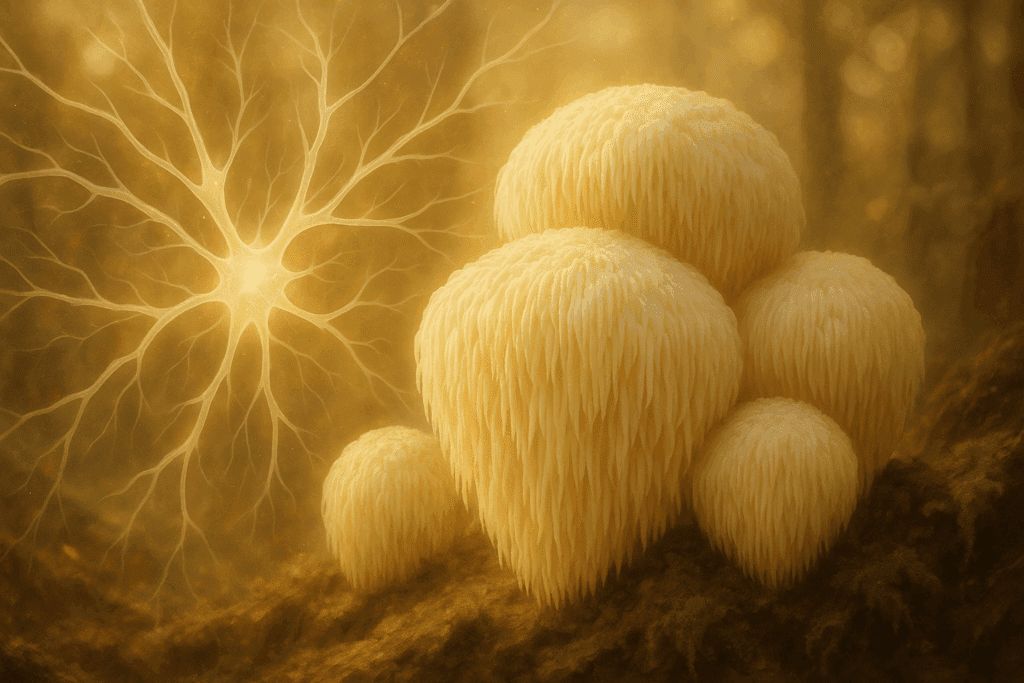
Lion’s Mane Mushroom: A Neurogenesis Powerhouse
Among the most studied nootropic mushrooms is Hericium erinaceus, better known as Lion’s Mane. Recognizable by its shaggy, cascading spines, Lion’s Mane is a rich source of hericenones and erinacines, two compounds shown to stimulate the synthesis of nerve growth factor. NGF is a critical molecule in the development and maintenance of neurons, and its presence has been linked to improved memory retention and faster cognitive processing.
Lion’s Mane’s impact on cognitive improvement is not just theoretical. In a double-blind, placebo-controlled study published in Phytotherapy Research, elderly participants who consumed Lion’s Mane over a 16-week period demonstrated significantly better performance on cognitive function tests compared to the control group. Importantly, these improvements diminished after discontinuation, suggesting a direct, ongoing relationship between the mushroom’s active compounds and brain health.
What makes Lion’s Mane especially intriguing is its potential role in treating neurodegenerative conditions. Early animal studies have indicated that Lion’s Mane may reduce amyloid plaque formation, a hallmark of Alzheimer’s disease. Its neuroprotective qualities, combined with its low toxicity and minimal side effects, make it a promising candidate for long-term cognitive support. Whether incorporated as a powdered supplement, tincture, or culinary ingredient, Lion’s Mane represents a powerful, evidence-backed tool for brain function enhancement.
Reishi Mushroom: The Calming Adaptogen for Mental Clarity
Known as the “mushroom of immortality,” Ganoderma lucidum—or Reishi—has a long history in Traditional Chinese Medicine. While traditionally used for boosting immunity and promoting longevity, modern research has begun to uncover its benefits for mental performance and emotional regulation. Reishi is rich in triterpenoids, polysaccharides, and peptidoglycans, all of which play a role in modulating the central nervous system.
Reishi does not function as a direct cognitive enhancer in the same way Lion’s Mane does. Instead, its strength lies in reducing the barriers to optimal brain performance, such as anxiety, inflammation, and sleep disruption. In this way, it facilitates a state of mental clarity and emotional balance that is conducive to cognitive improvement. Several studies have demonstrated Reishi’s efficacy in reducing stress-induced cognitive decline, making it an excellent adjunct for individuals experiencing mental fatigue or burnout.
Furthermore, Reishi’s ability to regulate the hypothalamic-pituitary-adrenal (HPA) axis helps to stabilize cortisol levels, thereby reducing the long-term impact of chronic stress on brain function. This makes it especially useful for students, professionals, and caregivers who face high cognitive demands. Through this adaptogenic mechanism, Reishi contributes not only to improved focus but also to the preservation of long-term neurological health.

Cordyceps: Oxygenating the Brain for Enhanced Focus
Cordyceps, particularly Cordyceps militaris and Cordyceps sinensis, are parasitic fungi known for their energizing properties. Traditionally used to boost athletic performance and libido, Cordyceps has more recently been studied for its effects on cerebral blood flow and mitochondrial function. These aspects are critical to brain function enhancement, especially in tasks requiring sustained attention and rapid processing speed.
By improving oxygen utilization and ATP production, Cordyceps helps fuel the brain during periods of high demand. This increased energy availability supports quicker cognitive responses, better working memory, and more consistent mental performance. In one randomized controlled trial, participants taking Cordyceps extract reported improvements in energy, focus, and cognitive endurance compared to those on a placebo.
Cordyceps also shows promise in mitigating cognitive decline associated with aging. Animal studies have indicated its capacity to reduce oxidative damage and maintain synaptic plasticity. These findings suggest that Cordyceps is not merely a stimulant but a restorative agent capable of supporting both immediate and long-term brain health. Whether consumed in capsule form or as a tea, Cordyceps offers a unique approach to enhancing cognitive performance through improved physiological efficiency.
Chaga Mushroom: Antioxidant Support for Cognitive Longevity
Inonotus obliquus, commonly known as Chaga, is a fungus that thrives on birch trees in cold climates. Dark and crusty on the outside, but rich in bioactive compounds within, Chaga is celebrated for its unparalleled antioxidant profile. High in superoxide dismutase, polyphenols, and melanin, Chaga serves as a formidable ally in combating oxidative stress, a key contributor to cognitive aging.
The link between antioxidants and cognitive improvement is well-documented in the scientific literature. Free radicals can damage brain cells, impair synaptic function, and accelerate neurodegenerative processes. By neutralizing these reactive oxygen species, Chaga helps preserve cellular integrity and enhance mental clarity. Moreover, its anti-inflammatory properties help maintain the delicate balance of the brain’s immune system, reducing the risk of neuroinflammation-related cognitive disorders.
Preliminary studies also suggest that Chaga may influence the gut-brain axis—a bidirectional communication system that affects mood, cognition, and immunity. By supporting the microbiome and enhancing nutrient absorption, Chaga indirectly contributes to brain function enhancement. Though more human studies are needed, existing evidence provides a compelling case for including Chaga in a cognitive support regimen.
Turkey Tail: Immune Modulation and Neuroimmune Balance
While best known for its cancer-fighting potential, Trametes versicolor—or Turkey Tail—has surprising implications for brain health. Rich in polysaccharopeptides such as PSK and PSP, Turkey Tail plays a pivotal role in modulating the immune system. This is particularly important in the context of cognitive function, where immune balance can either support or sabotage mental clarity.
Recent research in neuroimmunology has highlighted the role of microglial cells, the brain’s resident immune cells, in maintaining cognitive health. When overactivated, these cells can contribute to neuroinflammation, a known factor in cognitive decline and neurodegenerative diseases. Turkey Tail’s immunomodulatory effects help keep these cells in check, thereby promoting a more stable and supportive environment for neural function.
Additionally, Turkey Tail is a prebiotic powerhouse, fostering the growth of beneficial gut bacteria. The connection between gut health and brain function is well established, with disruptions in the gut microbiota linked to mood disorders, brain fog, and impaired cognition. By enhancing gut integrity and supporting microbial diversity, Turkey Tail contributes to a comprehensive approach to cognitive improvement. These multifaceted benefits make Turkey Tail a valuable, though often overlooked, player in the nootropic mushroom pantheon.
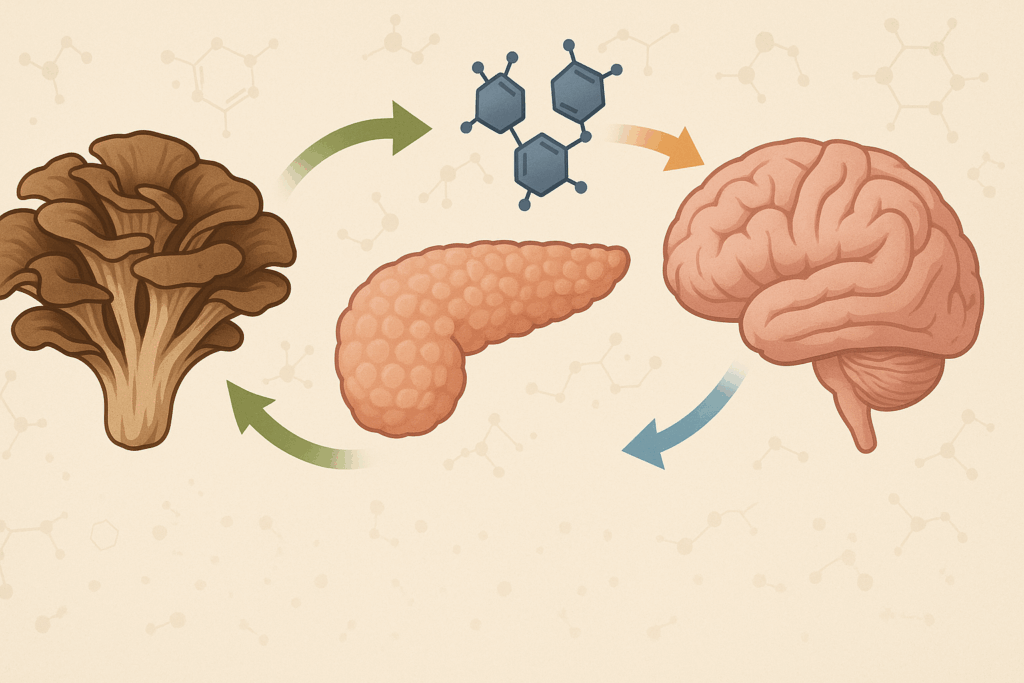
Cognitive Improvement with Maitake: Blood Sugar Balance and Brain Clarity
Maitake, or Grifola frondosa, is a culinary favorite with potent medicinal properties. While often celebrated for its immune-boosting effects, emerging evidence suggests that Maitake also contributes meaningfully to brain health. One of its key advantages lies in its ability to regulate blood glucose levels, a factor closely linked to mental performance and cognitive stability.
Fluctuating blood sugar can lead to energy crashes, irritability, and mental fog. Maitake’s ability to enhance insulin sensitivity and stabilize glucose metabolism helps maintain consistent energy levels, which are essential for sustained attention and decision-making. This metabolic stability underpins the broader process of cognitive improvement, particularly in environments that demand prolonged concentration.
Moreover, Maitake is rich in beta-glucans and other polysaccharides that support immune and gut health, both of which are instrumental in maintaining neurological resilience. Studies have also shown that Maitake extracts can enhance the production of certain neurotransmitters, including dopamine and serotonin, which are essential for motivation, focus, and emotional regulation. These neurochemical benefits, combined with its metabolic balancing properties, position Maitake as an effective tool for optimizing both brain and body.
Shiitake and the Neurovascular Connection to Brain Function Enhancement
Often praised for its savory flavor and culinary versatility, Lentinula edodes, or Shiitake mushroom, also deserves recognition for its contributions to cognitive vitality. Shiitake is a source of eritadenine and lentinan—compounds with demonstrated cardiovascular and immunomodulatory benefits. These effects, while seemingly peripheral, are directly relevant to brain health through the neurovascular connection.
Healthy blood flow is essential for nutrient delivery, waste removal, and overall brain performance. Shiitake’s role in lowering cholesterol and improving endothelial function supports this vascular health, thereby enhancing cerebral perfusion. This results in better oxygenation and nutrient availability for brain cells, laying a foundation for long-term cognitive resilience.
In addition, Shiitake contains B-vitamins, including B6 and folate, which play essential roles in neurotransmitter synthesis and homocysteine metabolism. Elevated homocysteine is associated with an increased risk of cognitive decline, so its regulation is crucial. By addressing both vascular and neurochemical pathways, Shiitake contributes comprehensively to brain function enhancement. As research continues to illuminate these mechanisms, the humble Shiitake is proving to be a sophisticated agent of neurological support.
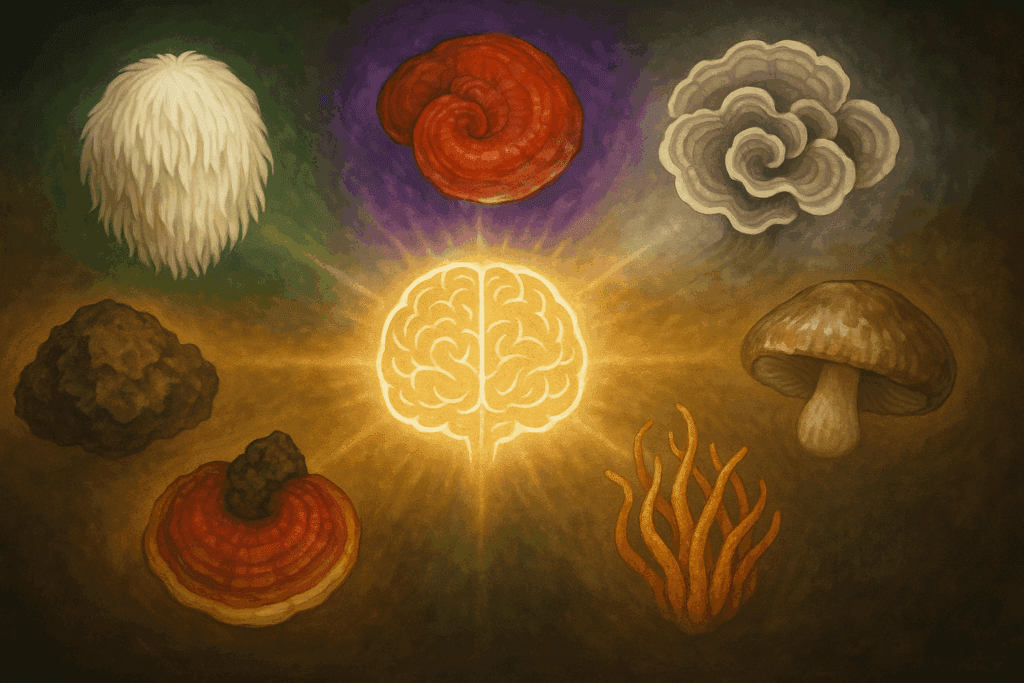
The Synergistic Potential of Mushroom Combinations
While each of the mushrooms discussed offers unique cognitive benefits, the concept of synergy should not be overlooked. Combining these mushrooms—whether in supplement formulations or dietary routines—may amplify their effects through complementary mechanisms. For instance, pairing the neurogenesis-promoting effects of Lion’s Mane with the stress-mitigating properties of Reishi can provide both structural and functional support for the brain.
Moreover, the cumulative antioxidant, anti-inflammatory, and immunomodulatory actions of these fungi can create a more holistic environment for brain health. This integrative approach mirrors the way traditional medicine systems view the body—not as a collection of isolated systems, but as a dynamic, interconnected whole. The inclusion of diverse mushroom species can therefore be seen as a strategy not just for improving memory or focus in the short term, but for sustaining cognitive vitality across the lifespan.
Modern supplement companies are beginning to capitalize on this concept, creating blends that offer standardized extracts of multiple mushrooms in synergistic ratios. These blends are often optimized for bioavailability and supported by rigorous quality control measures. For consumers, the key is to choose products that provide transparent sourcing, clinically relevant dosages, and third-party testing. This ensures that the synergistic potential of these powerful fungi is realized in both safety and efficacy.
Cognitive Improvement as a Lifelong Journey
It is important to recognize that cognitive improvement is not a one-time intervention but a continuous process shaped by lifestyle, environment, and biochemistry. Nootropic mushrooms offer a natural, sustainable pathway for enhancing mental function, but they are most effective when integrated into a broader framework of wellness. This includes regular physical activity, adequate sleep, mental stimulation, stress management, and a nutrient-rich diet.
In this context, mushrooms serve not just as isolated interventions but as catalysts for broader transformation. Their adaptogenic qualities help the body and brain adapt to stress, while their neuroprotective compounds support long-term cognitive resilience. For college students aiming to maximize learning, professionals striving for peak performance, or older adults hoping to preserve mental clarity, nootropic mushrooms provide a scientifically grounded, versatile toolkit.
As research continues to unfold, the future of brain health may increasingly depend on our ability to harness these natural compounds. By respecting their complexity and using them thoughtfully, we open the door to not only enhanced cognition but a more balanced and vibrant life.
Frequently Asked Questions: Exploring Nootropic Mushrooms for Cognitive Improvement
1. What is the best time of day to take nootropic mushrooms for brain function enhancement?
The optimal timing for nootropic mushroom consumption often depends on the type of mushroom and the desired effect. For instance, Lion’s Mane, known for supporting neurogenesis and alertness, is typically best taken in the morning or early afternoon to complement the brain’s natural circadian rhythm. Reishi, on the other hand, has calming, adaptogenic effects and is more suited for evening use to support sleep and mental recovery. To maximize brain function enhancement, some individuals choose to microdose different types of mushrooms throughout the day—stimulating types in the morning and calming ones later. Consistency is key, as the benefits of cognitive improvement from these fungi accumulate over time rather than appearing immediately.
2. Can nootropic mushrooms be used alongside other cognitive supplements or medications?
Yes, but with caution and professional guidance. While nootropic mushrooms such as Lion’s Mane, Reishi, and Cordyceps are generally well tolerated, combining them with prescription medications or synthetic nootropics can potentially lead to interactions. For example, Reishi has mild blood-thinning properties and might amplify the effects of anticoagulants. Furthermore, stacking mushrooms with other brain supplements like omega-3 fatty acids, ginkgo biloba, or racetams may enhance cognitive improvement but should be carefully monitored. Always consult a healthcare professional before initiating any regimen involving multiple cognitive enhancers, particularly for those managing chronic conditions or using prescription drugs.
3. How long does it typically take to notice the effects of nootropic mushrooms?
The timeline for experiencing noticeable cognitive benefits from nootropic mushrooms varies significantly by individual. Factors such as age, baseline brain health, lifestyle, and dosage all influence how quickly improvements emerge. In most cases, subtle changes in mental clarity and focus may appear within two to four weeks of consistent use. However, deeper benefits such as enhanced memory, better stress resilience, and long-term brain function enhancement often require several months of daily supplementation. Importantly, these mushrooms tend to work gradually and cumulatively, so patience and consistency are essential for sustainable cognitive improvement.
4. Are there any long-term side effects associated with nootropic mushroom use?
Nootropic mushrooms are generally safe when taken in appropriate doses, even over extended periods. That said, there are isolated reports of mild digestive upset or allergic reactions, especially among individuals new to medicinal mushrooms. Some research suggests that chronic overuse of certain compounds, like polysaccharides, could potentially influence liver enzymes or immune responses, although evidence remains inconclusive. From an EEAT perspective, current clinical data supports the safety of long-term use, particularly when the mushrooms are consumed in extract form with verified purity. Users are encouraged to cycle their supplements occasionally and choose high-quality, third-party-tested products to minimize any potential adverse effects.
5. Can nootropic mushrooms improve performance under high-stress cognitive tasks?
Yes, many nootropic mushrooms are particularly well-suited to support brain performance during periods of high cognitive demand. For instance, Cordyceps enhances oxygen utilization and cellular energy, making it valuable for sustained focus and endurance during mentally taxing tasks. Reishi’s adaptogenic qualities help stabilize the stress response, thereby preserving working memory and reducing emotional reactivity. When combined with healthy stress management techniques, these mushrooms can enhance both immediate cognitive capacity and long-term resilience. This functional synergy is especially beneficial for professionals in high-pressure environments, such as finance, law, or academia, where brain function enhancement is not just advantageous but essential.
6. How do nootropic mushrooms differ from traditional stimulants like caffeine or modafinil?
Unlike synthetic stimulants that act primarily by elevating neurotransmitter levels abruptly, nootropic mushrooms work by gradually nourishing and protecting neural pathways. Lion’s Mane, for example, promotes the growth of new neurons through NGF stimulation, while caffeine simply blocks adenosine receptors to temporarily boost alertness. Mushrooms like Chaga and Shiitake offer antioxidant support, which contributes to longer-term cognitive improvement rather than immediate stimulation. This fundamental difference means that nootropic mushrooms have fewer side effects such as jitteriness, crashes, or dependency. They are best viewed as part of a holistic cognitive enhancement strategy rather than a quick fix.
7. What role does diet play in enhancing the effects of nootropic mushrooms?
Diet can significantly influence how effectively the body absorbs and utilizes the bioactive compounds in nootropic mushrooms. A nutrient-rich, anti-inflammatory diet amplifies the benefits of mushrooms by supporting the gut-brain axis and promoting neurochemical balance. For example, pairing mushrooms with healthy fats—like those found in avocados, nuts, or olive oil—can improve the absorption of fat-soluble triterpenes. Additionally, a diet rich in magnesium, B vitamins, and antioxidants further supports brain function enhancement by complementing the mushrooms’ effects. Staying well-hydrated and avoiding processed foods can also ensure that the body’s detoxification systems remain efficient, which indirectly supports mental clarity and emotional stability.
8. Are there specific populations who should avoid nootropic mushroom supplementation?
Yes, certain individuals should approach nootropic mushrooms with caution. Those with autoimmune disorders, for instance, may experience immune system stimulation that could exacerbate their condition. Similarly, individuals on immunosuppressive therapy or blood-thinning medications should consult with a medical provider before use. Pregnant and breastfeeding women are generally advised to avoid medicinal mushrooms due to the lack of sufficient safety data in these populations. Children and adolescents may not require supplementation unless under the direction of a healthcare professional. While cognitive improvement is a universal goal, the path to achieving it must always consider individual health contexts and contraindications.
9. How do mushroom-based supplements ensure consistent potency and bioavailability?
Quality varies widely in the mushroom supplement industry, so consumers must be discerning. High-quality products typically use dual extraction methods to capture both water-soluble polysaccharides and alcohol-soluble triterpenes, ensuring comprehensive bioactivity. Some reputable brands also standardize their extracts to specific beta-glucan or hericenone content, offering reliable dosing for cognitive improvement. Additional techniques such as micronization improve absorption by breaking down the mushroom particles into smaller, more bioavailable forms. Finally, choosing supplements that are grown on organic substrates, tested for heavy metals and contaminants, and verified by third-party labs ensures the safety and effectiveness of long-term brain function enhancement.
10. What is the future of nootropic mushrooms in mainstream cognitive enhancement?
The future of nootropic mushrooms looks promising, especially as interest in sustainable, natural solutions for cognitive improvement continues to rise. Advancements in mycological research are uncovering new bioactive compounds with specific neurological benefits, and biotech companies are exploring ways to isolate and enhance these molecules. Clinical trials are expanding to test mushrooms in combination with other interventions like mindfulness, neurofeedback, and smart nutrition. Additionally, there is growing interest in personalized mushroom regimens based on genetic and neurobiological profiles, opening new doors for individualized brain function enhancement. As regulatory frameworks evolve and public education improves, nootropic mushrooms may soon become a cornerstone of integrative cognitive health strategies for both prevention and performance.
Conclusion: Embracing Mushroom Power for Lasting Brain Function Enhancement
The journey through the world of nootropic mushrooms reveals a compelling narrative of scientific discovery, traditional wisdom, and transformative potential. From the neurogenesis-promoting effects of Lion’s Mane to the stress-balancing adaptogenic profile of Reishi, each fungus contributes uniquely to the landscape of cognitive improvement. As we’ve explored, these benefits are not limited to short-term focus or memory gains; they represent a broader commitment to long-term brain function enhancement grounded in biological synergy and clinical evidence.
What makes these mushrooms particularly remarkable is their multidimensional nature. They do not merely stimulate or suppress one pathway; rather, they harmonize various systems—immune, vascular, metabolic, and neurological—to create the conditions under which the brain can truly thrive. Their role in supporting neuroplasticity, reducing oxidative damage, and optimizing neurotransmitter balance offers a rare combination of preventive and performance-enhancing effects.
For readers seeking evidence-based, holistic tools to support mental clarity, emotional regulation, and cognitive resilience, the integration of nootropic mushrooms into daily life holds immense promise. Whether consumed individually or as part of a synergistic blend, these fungi offer more than just nutritional value—they provide a framework for lifelong brain health. As always, individuals should consult with healthcare professionals to personalize their approach, particularly when managing existing health conditions or medications.
Ultimately, in a world where cognitive demands are higher than ever, turning to nature’s pharmacy may be one of the most intelligent decisions we can make. By embracing these powerful, research-backed mushrooms, we not only enhance our present mental capabilities but also invest in the future of our cognitive well-being.
